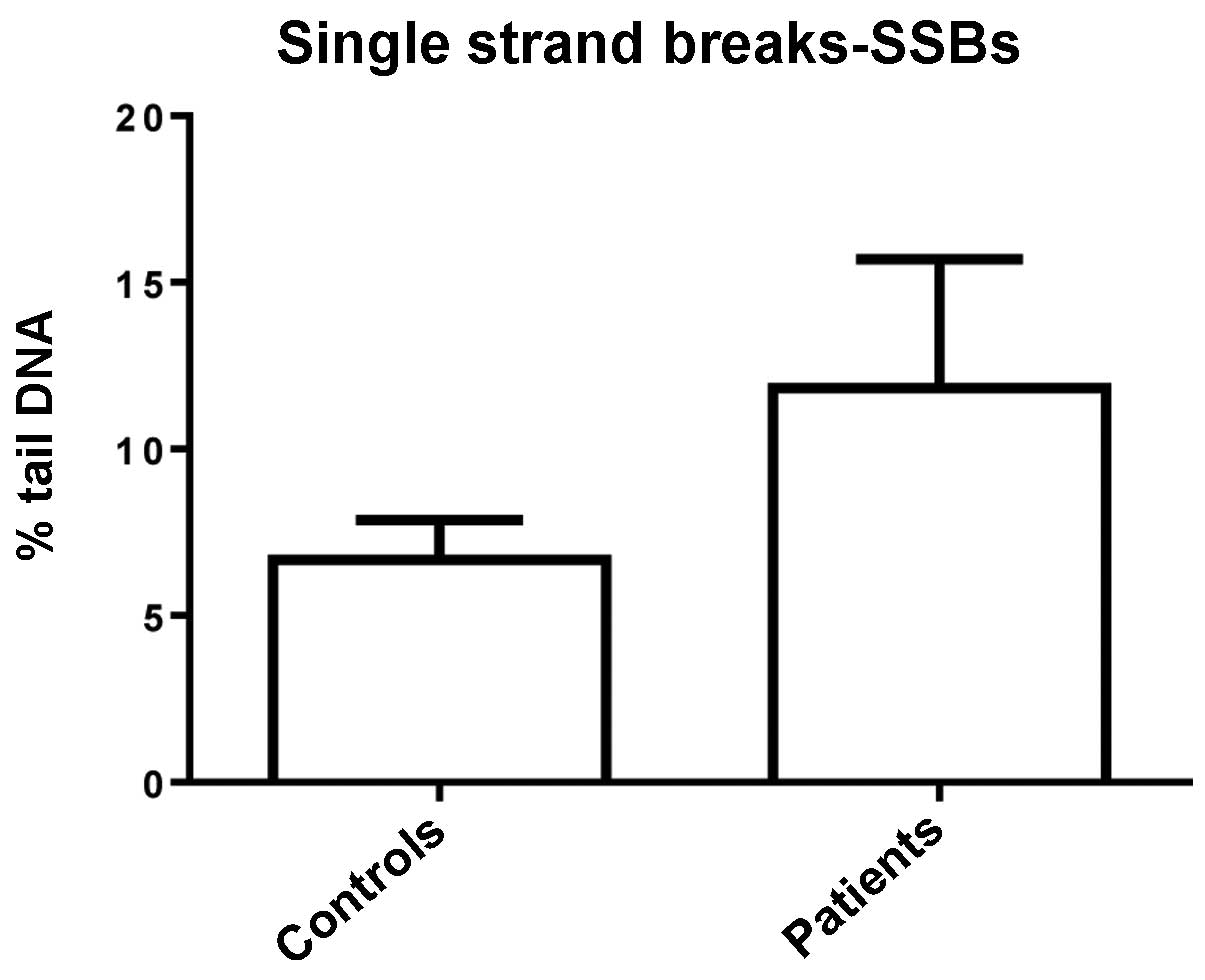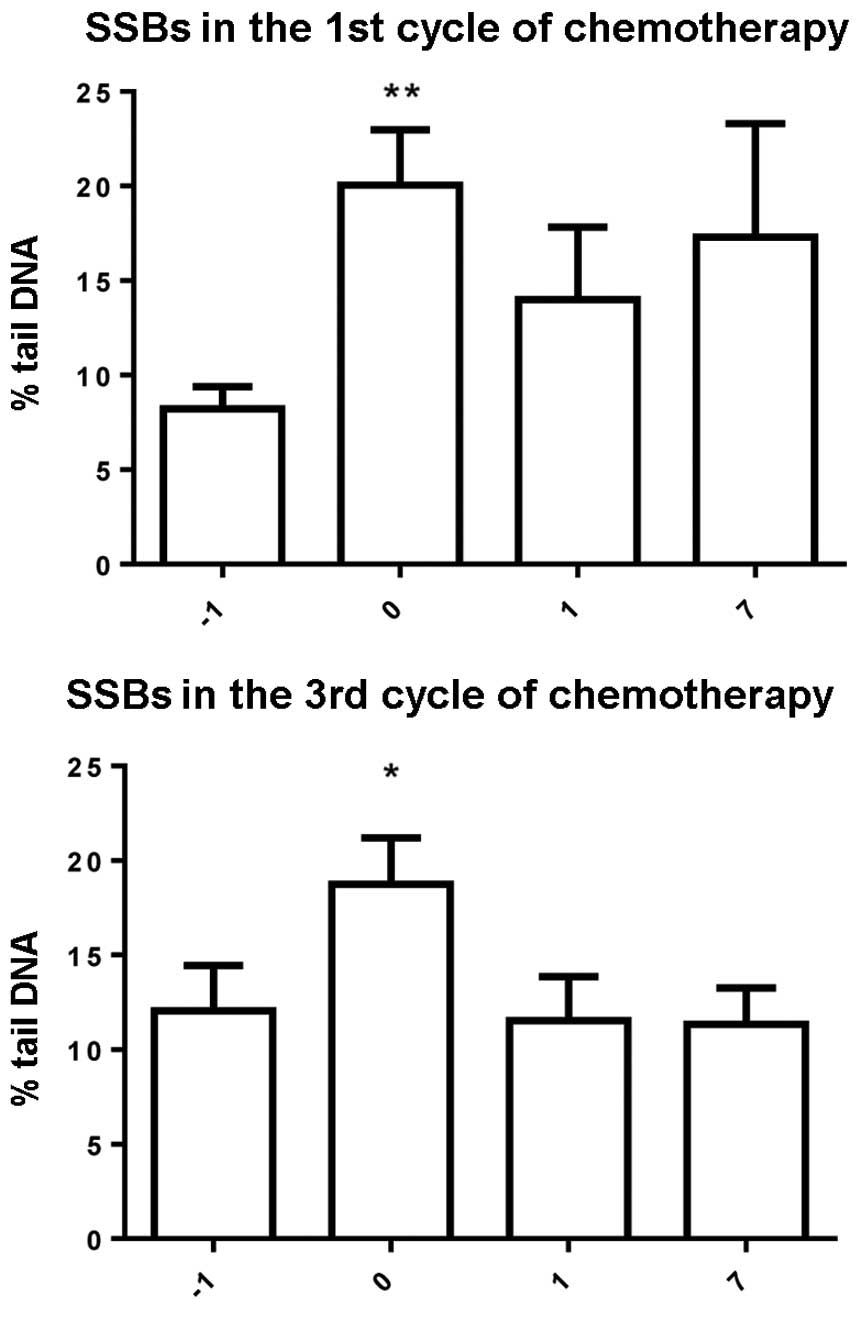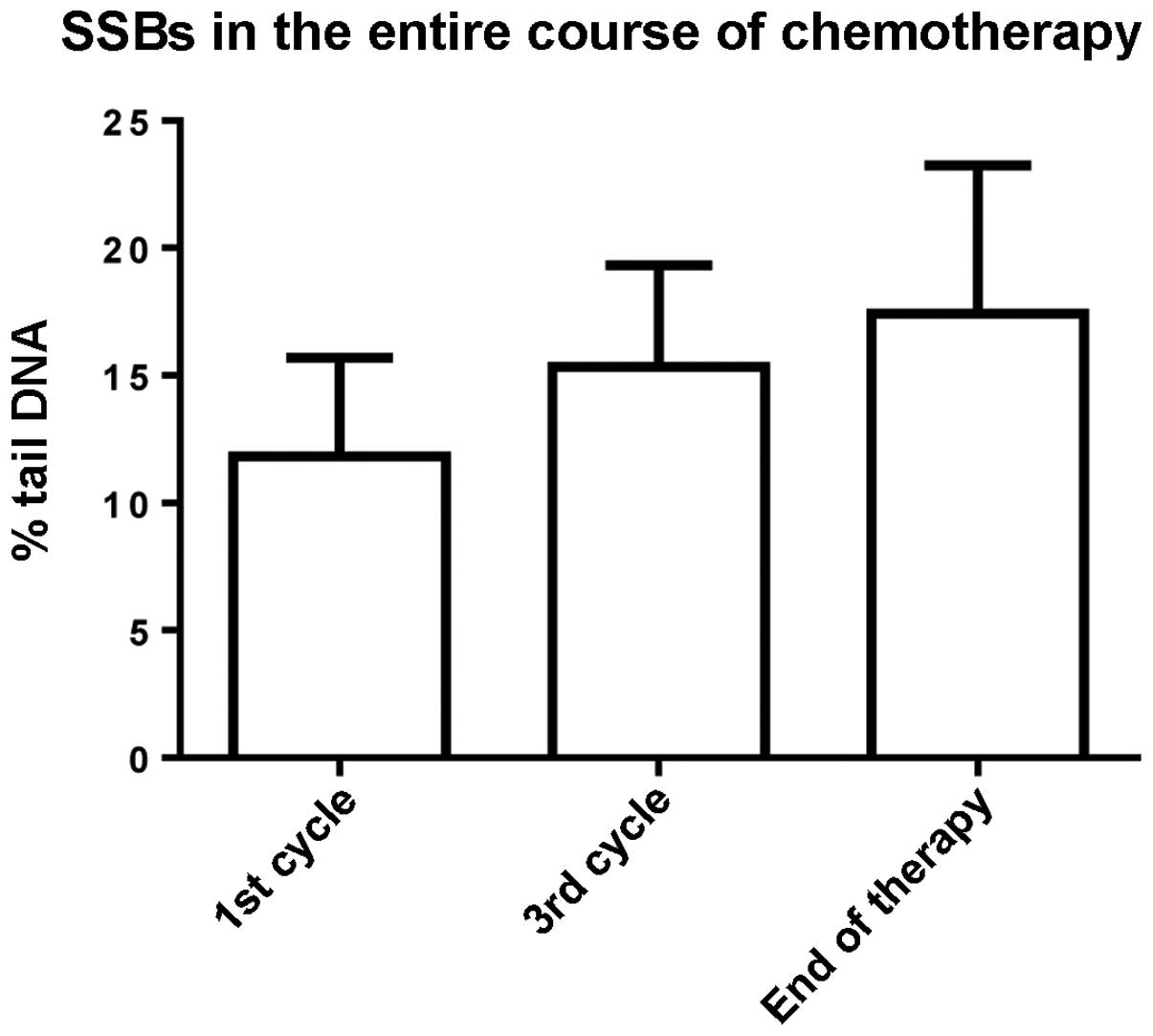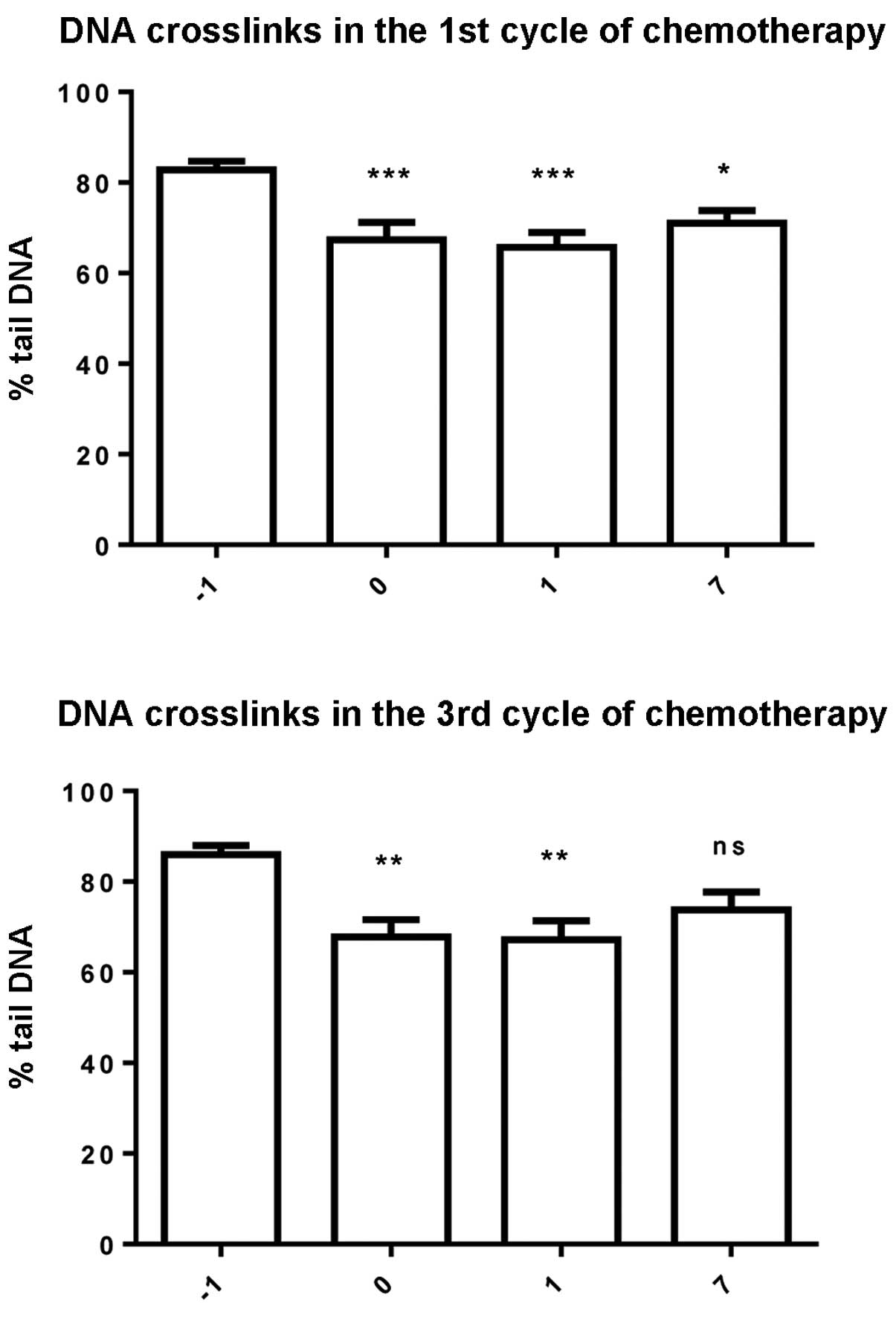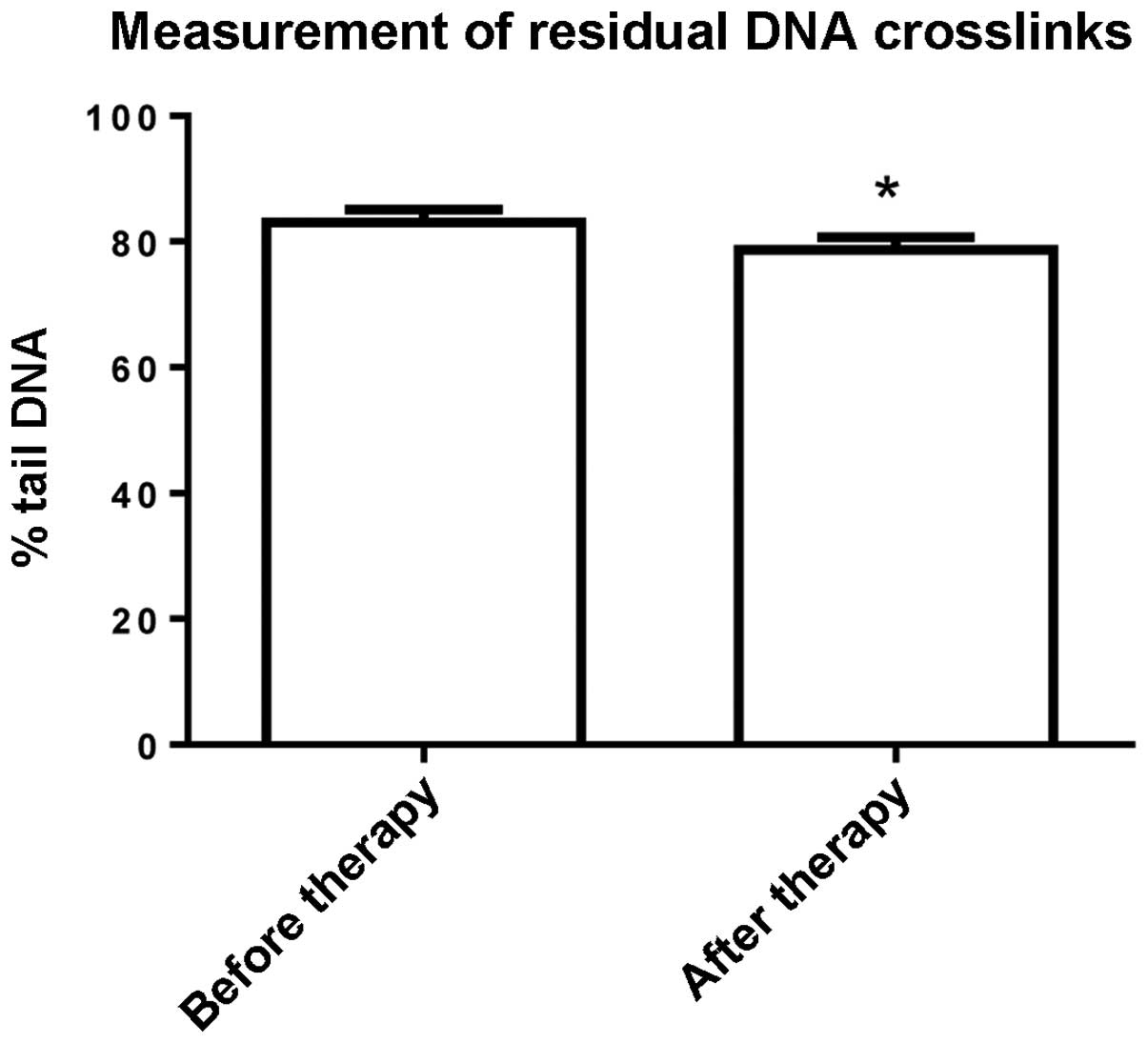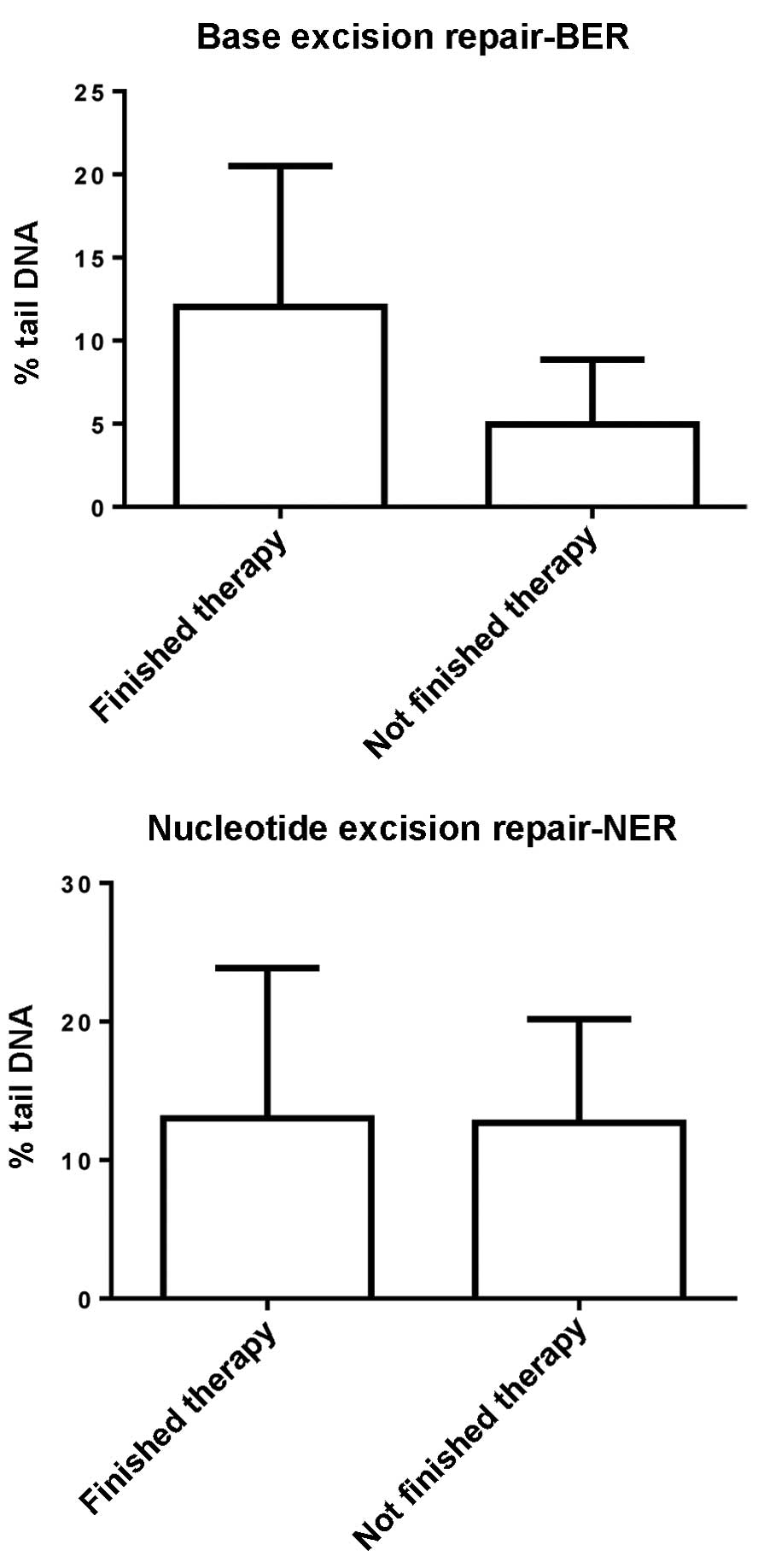|
1
|
Crohns M, Liippo K, Erhola M, Kankaanranta
H, Moilanen E, Alho H and Kellokumpu-Lehtinen P: Concurrent decline
of several antioxidants and markers of oxidative stress during
combination chemotherapy for small cell lung cancer. Clin Biochem.
12:1236–1245. 2009. View Article : Google Scholar : PubMed/NCBI
|
|
2
|
Gurubhagavatula S, Liu G, Park S, Zhou W,
Su L, Wain JC, Lynch TJ, Neuberg DS, David C and Christiani DC: XPD
and XRCC1 genetic polymorphisms are prognostic factors in advanced
non-small-cell lung cancer patients treated with platinum
chemotherapy. J Clin Oncol. 22:2594–2601. 2004. View Article : Google Scholar : PubMed/NCBI
|
|
3
|
Almeida GM, Duarte TL, Steward WP and
Jones GD: Detection of oxaliplatin-induced DNA crosslinks in vitro
and in cancer patients using the alkaline comet assay. DNA Repair.
5:219–225. 2005. View Article : Google Scholar : PubMed/NCBI
|
|
4
|
Rosenberg B: Fundamental studies with
cisplatin. Cancer. 55:2303–2316. 1985. View Article : Google Scholar
|
|
5
|
Lebwohl D and Canetta R: Clinical
development of platinum complexes in cancer therapy: an historical
perspective and an update. Eur J Cancer. 34:1522–1534. 1998.
View Article : Google Scholar : PubMed/NCBI
|
|
6
|
Dronkert ML and Kannar R: Repair of DNA
interstrand cross-links. Mutat Res. 486:217–247. 2001. View Article : Google Scholar : PubMed/NCBI
|
|
7
|
Unger FT, Klasen HA, Tchartchian G, de
Wilde RL and Witte I: DNA damage induced by cis- and carboplatin as
indicator for in vitro sensitivity of ovarian carcinoma cells. BMC
Cancer. 9:3592009. View Article : Google Scholar : PubMed/NCBI
|
|
8
|
Rabik CA and Dolan ME: Molecular
mechanisms of resistance and toxicity associated with platinating
agents. Cancer Treat Rev. 33:9–23. 2007. View Article : Google Scholar : PubMed/NCBI
|
|
9
|
McKenna DJ, McKeown SR and McKelvey-Martin
VJ: Potential use of the comet assay in the clinical management of
cancer. Mutagenesis. 23:183–190. 2008. View Article : Google Scholar : PubMed/NCBI
|
|
10
|
Faust F, Kassie F, Knasmuller S, Boedecker
RH, Mann M and Mersch-Sundermann V: The use of the alkaline comet
assay with lymphocytes in human biomonitoring studies. Mutat Res.
566:209–229. 2004. View Article : Google Scholar : PubMed/NCBI
|
|
11
|
Collins AR and Ferguson LR: DNA repair as
a biomarker. Mutat Res. 736:2–4. 2012. View Article : Google Scholar : PubMed/NCBI
|
|
12
|
Singh NP, McCoy MT, Tice RR and Schneider
EL: A simple technique for the quantitation of low levels of DNA
damage in individual cells. Exp Cell Res. 175:184–191. 1988.
View Article : Google Scholar : PubMed/NCBI
|
|
13
|
Collins AR: The comet assay for DNA damage
and repair: principles, applications, and limitations. Mol
Biotechnol. 26:249–261. 2004. View Article : Google Scholar : PubMed/NCBI
|
|
14
|
Boyum A: Separation of white blood cells.
Nature. 204:793–794. 1964. View
Article : Google Scholar : PubMed/NCBI
|
|
15
|
Collins AR, Dobson VL, Dusinská M, Kennedy
G and Stětina R: The comet assay: what can it really tell us? Mutat
Res. 375:183–193. 1997. View Article : Google Scholar : PubMed/NCBI
|
|
16
|
Fikrova P, Stetina R, Hrnciarik M, Rehacek
V, Jost P, Hronek M and Zadak Z: Detection of DNA crosslinks in
peripheral lymphocytes isolated from patients treated with platinum
derivates using modified comet assay. Neoplasma. 60:413–418. 2013.
View Article : Google Scholar
|
|
17
|
Collins AR, Dušinská M, Horváthová E,
Munro E, Savio M and Stětina R: Inter-individual differences in
repair of DNA base oxidation, measured in vitro with the comet
assay. Mutagenesis. 16:297–301. 2001. View Article : Google Scholar : PubMed/NCBI
|
|
18
|
Gaivão I, Piasek A, Brevik A, Shaposhnikov
S and Collins AR: Comet assay based methods for measuring DNA
repair in vitro; estimates of inter- and intraindividual variation.
Cell Biol Toxicol. 25:45–52. 2009.PubMed/NCBI
|
|
19
|
Langie SA, Knaapen AM, Brauers KJJ, van
Berlo D, van Schooten FJ and Godschalk RWL: Development and
validation of a modified comet assay to phenotypically assess
nucleotide excision repair. Mutagenesis. 21:153–158. 2006.
View Article : Google Scholar : PubMed/NCBI
|
|
20
|
Azqueta A, Shaposhnikov S and Collins AR:
DNA repair measured by the comet assay. DNA Repair. Kruman I:
InTech; Croatia: 2011, View
Article : Google Scholar : 2011, Available
from: http://www.intechopen.com/books/dna-repair/dna-repair-measured-by-the-comet-assay.
|
|
21
|
Palyvoda O, Polanska J, Wygoda A and
Rzeszowska-Wolny J: DNA damage and repair in lymphocytes of normal
individuals and cancer patients: studies by the comet assay and
micronucleus tests. Acta Biochim Pol. 50:181–190. 2003.PubMed/NCBI
|
|
22
|
Smith TR, Miller MS, Lohman KK, Case LD
and Hu JJ: DNA damage and breast cancer risk. Carcinogenesis.
24:883–889. 2003. View Article : Google Scholar : PubMed/NCBI
|
|
23
|
Rajeswari N, Ahuja YR, Malini U,
Chandrashekar S, Balakrishna N, Rao KV and Khar A: Risk assessment
in first degree female relatives of breast cancer patients using
the alkaline comet assay. Carcinogenesis. 21:557–561. 2000.
View Article : Google Scholar
|
|
24
|
Sanchez C, Clementi M, Benitez D,
Contreras H, Huidobro C and Castellon E: Effect of GnRH analogs on
the expression of TrkA and p75 neurotrophin receptors in primary
cell cultures from human prostate adenocarcinoma. Prostate.
65:195–202. 2005. View Article : Google Scholar : PubMed/NCBI
|
|
25
|
Lin X, Wood CG, Shao L, Huang M, Yang H,
Dinney CP and Wu X: Risk assessment of renal cell carcinoma using
alkaline comet assay. Cancer. 110:282–288. 2007. View Article : Google Scholar : PubMed/NCBI
|
|
26
|
Schabath MB, Grossman HB, Delclos GL,
Hernandez LM, Day RS, Davis BR, Lerner SP, Spitz MR and Wu X:
Dietary carotenoids and genetic instability modify bladder cancer
risk. J Nutr. 134:3362–3369. 2004.PubMed/NCBI
|
|
27
|
Lou J, He J, Zheng W, Jin L, Chen Z, Chen
S, Lin Y and Xu S: Investigating the genetic instability in the
peripheral lymphocytes of 36 untreated lung cancer patients with
comet assay and micronucleus assay. Mutat Res. 617:104–110. 2007.
View Article : Google Scholar : PubMed/NCBI
|
|
28
|
Tudek B: Base excision repair modulation
as a risk factor for human cancers. Mol Aspects Med. 28:258–275.
2007. View Article : Google Scholar : PubMed/NCBI
|
|
29
|
Paz-Elizur T, Krupsky M, Elinger D,
Schechtman E and Livneh Z: Repair of the oxidative DNA damage
8-oxoguanine as a biomarker for lung cancer risk. Cancer Biomark.
1:201–205. 2005.PubMed/NCBI
|
|
30
|
Sánchez-Suárez P, Ostrosky-Wegman P,
Gallegos-Hernández F, Peñarroja-Flores R, Toledo-García J, Bravo
JL, Del Castillo ER and Benítez-Bribiesca L: DNA damage in
peripheral blood lymphocytes in patients during combined
chemotherapy for breast cancer. Mutat Res. 640:8–15.
2008.PubMed/NCBI
|
|
31
|
Kopjar N, Garaj-Vrhovac V and Milas I:
Assessment of chemotherapy-induced DNA damage in peripheral blood
leukocytes of cancer patients using the alkaline comet assay.
Teratog Carcinog Mutagen. 22:13–30. 2002. View Article : Google Scholar : PubMed/NCBI
|
|
32
|
Plummer ER, Middleton MR, Jones C, Olsen
A, Hickson I, McHugh P, Margison GP, McGown G, Thorncroft M, Watson
AJ, Boddy AV, Calvert AH, Harris AL, Newell DR and Curtin NJ:
Temozolomide pharmacodynamics in patients with metastatic melanoma:
DNA damage and activity of repair enzymes
O6-alkylguanine alkyltransferase and
poly(ADP-ribose) polymerase-1. Clin Cancer Res. 11:3402–3409. 2005.
View Article : Google Scholar : PubMed/NCBI
|
|
33
|
Wynne P, Newton C, Ledermann JA, Olaitan
A, Mould TA and Hartley JA: Enhanced repair of DNA interstrand
crosslinking in ovarian cancer cells from patients following
treatment with platinum-based chemotherapy. Br J Cancer.
97:927–933. 2007.PubMed/NCBI
|
|
34
|
Li XQ, Li J, Shi SB, Chen P, Yu LC and Bao
QL: Expression of MRP1, BCRP, LRP and ERCC1 as prognostic factors
in non-small cell lung cancer patients receiving postoperative
cisplatin-based chemotherapy. Int J Biol Markers. 24:230–237.
2009.PubMed/NCBI
|
|
35
|
Rosell R, Lord RV, Taron M and Reguart N:
DNA repair and cisplatin resistance in non-small-cell lung cancer.
Lung Cancer. 38:217–227. 2002. View Article : Google Scholar : PubMed/NCBI
|















